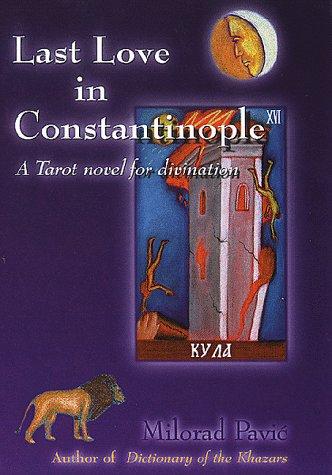In 1988 Milorad Pavic burst upon the literary scene with his critically acclaimed, international best seller, Dictionary of the Khazars.
 In it
he asked his readers to experience his book in a
new and exciting way, as he challenged their traditional
concepts of the reading process. In his next two
novels, Landscape Painted With Tea and The Inner Side of the Wind, he
continued to
challenge as he joined a modern Odyssey with a crossword puzzle, and
then he told the same tale of two lovers from two
perspectives — male and female — and asked us to read
it from either front or back. His new novel, Last Love in
Constantinople, does not disappoint, as Pavic once again demonstrates
himself to be a master of narrative legerdemain.
In it
he asked his readers to experience his book in a
new and exciting way, as he challenged their traditional
concepts of the reading process. In his next two
novels, Landscape Painted With Tea and The Inner Side of the Wind, he
continued to
challenge as he joined a modern Odyssey with a crossword puzzle, and
then he told the same tale of two lovers from two
perspectives — male and female — and asked us to read
it from either front or back. His new novel, Last Love in
Constantinople, does not disappoint, as Pavic once again demonstrates
himself to be a master of narrative legerdemain.Fate, love, lust, and honor become increasingly entangled as the reader moves through this delicious story probing the chaotic, frenzied nature of life. Set during the time of the Napoleonic Wars, this is the story of Lieutenant Opujic, a cavalry officer. The novel pits his family against the Teneckis family, as it unravels power struggles in a chaotic Europe, in fractured families, and in the human soul. Echoes of the Iliad abound as Opujic struggles to escape the shadow of a powerful father. All the elements of the great dramas are here: wars, prophecies, heroes, villains, damsels, saviors, devils, and God. But Pavic refuses to play by the usual rules as he invites us on his postmodernist journey to divine the fate of the lusty, swashbuckling hero and his loves on his journey to self-discovery from Trieste to Constantinople.
The book comes complete with Tarot cards (drawn by Pavic’s son, Ivan) that hold the fate not just of the characters but of the reading process itself. How your cards turn up will determine in what sequence the book is to be read (if you choose to do it this way), as the fates of the characters interchange, enmesh, surprise. Yet for all its magic and literary brilliance, the book creates perhaps the most realistic or postmodern of reading experiences — for just as life can be exhilarating and unpredictable and full of surprises, so too is Last Love in Constantinople.
Milorad Pavic, born in Belgrade, Yugoslavia, has written several books of poetry, short stories, and four novels. His books have been translated into forty-one languages. All of his internationally acclaimed novels have been rendered into English by his long-time translator, Christina Pribichevich-Zoric
“Pavic thinks the way we dream.” — Robert Coover, The New York Review of Books
“Whether read sequentially or according to the order of a [tarot card] deal, the novel is a fascinating, surrealistic dreamscape marked by a vibrant, folkloric imagery. Recommended.” — Library Journal
“Pavic cannot help but create a text that extends the conventional boundaries of the novel. Ambitious in its ingenuity is Last Love in Constantinople, which proves to be a worthy addition to the impressive oeuvre of a literary pioneer.Beautifully lucid yet nonsequential sentences enhance the magical-realist quality of his work.” — Review of Contemporary Fiction
“Pavic’s brief chapters tend to be compelling and assured, the work of a skilled and unconvential storyteller.” — Publishers Weekly
“An often entertaining fantastical tale of love, war, and death set in Eastern Europe from the accomplished Serbian author whose highly praised game-oriented fiction includes Dictionary of the Khazars.” — Kirkus Reviews